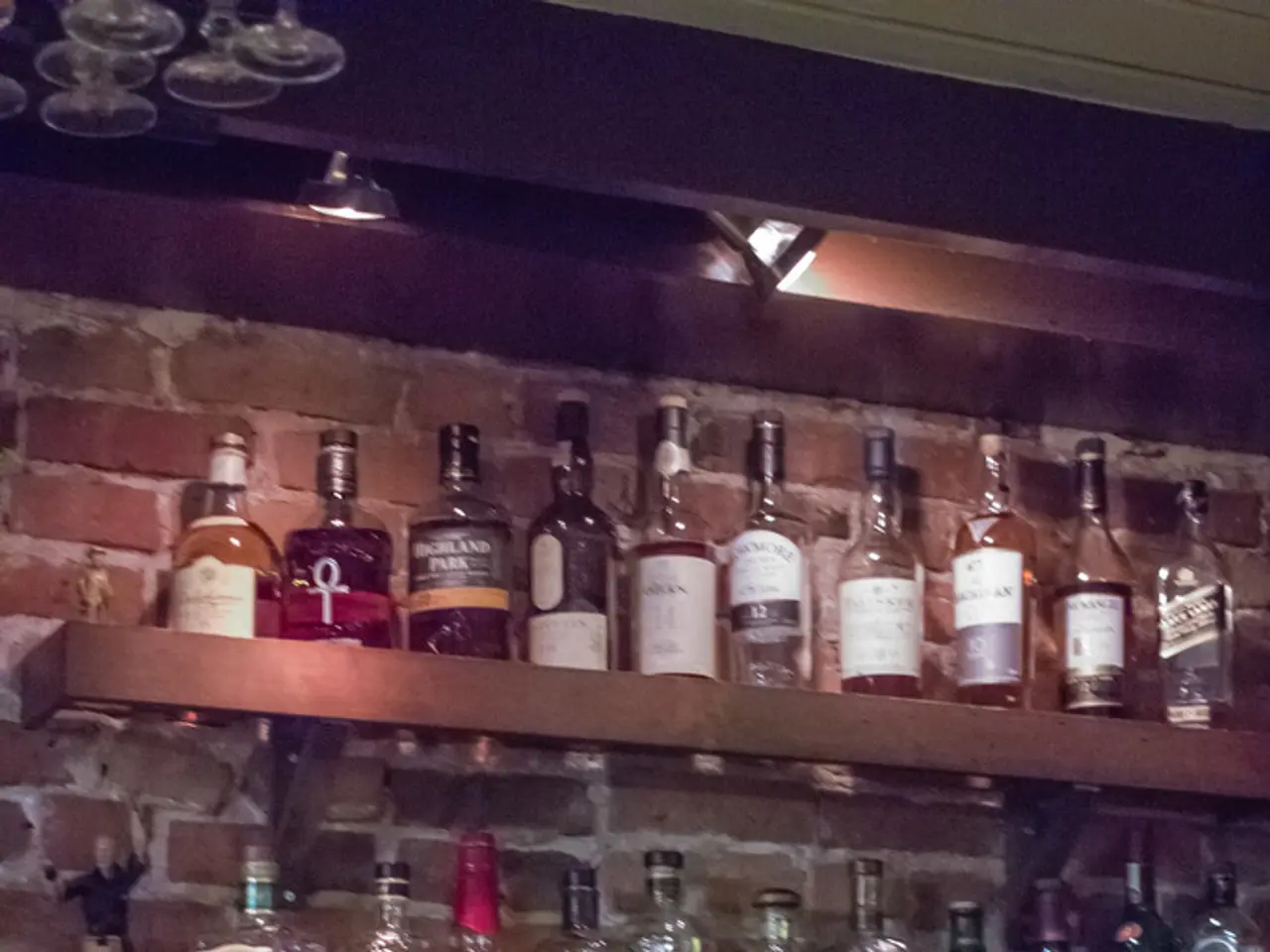Wine Shelf Life and Potential Risks of Consuming Spoiled Wine
Wine enthusiasts often wonder about the best ways to store their favourite bottles, ensuring they can enjoy them at their peak. Here are some essential tips for maintaining the quality and longevity of your wines.
Storing wine horizontally keeps the cork moist, preventing it from drying out and allowing oxygen to pass into the bottle, which can spoil the wine. To store wine correctly, choose a cool and dark place, store corked bottles horizontally, maintain the right humidity (around 60%), and consider using a wine fridge if necessary.
The storage conditions for different types of wine vary. For instance, unopened red wine can last for 2-3 years, while sparkling wine typically lasts for 1-2 days when opened. Non-vintage sparkling wine can last for 3-4 years if unopened, while vintage sparkling wine can last for 5-10 years. Bottled rosé can last for 1-2 years if unopened, and rosé wine can last for 3-5 days when opened. Fortified wine can last for decades if unopened.
Proper storage techniques can significantly extend the shelf life of wine. Maintaining a consistent cool temperature (around 55°F or 13°C), controlling humidity between 60-70%, and avoiding exposure to direct light are key factors. Wine should be stored in a dark, vibration-free environment away from heat sources like ovens and sunlight.
Common signs of spoilage in both opened and unopened wine include changes in color, off smells, and unusual tastes. For example, white wines that turn a deep yellow or brown color, or red wines that shift from vibrant purple-red to dull brown or cloudy orange-brown, are likely spoiled. Spoiled wine may also emit musty, basement-like, or wet cardboard smells, or sweet odors in dry whites indicating spoilage. Taste signs include a vinegar-like sourness, fizzing in still wines, a flat or dull flavor lacking fruitiness, or a sour taste in red wines.
It's important to note that spoilage due to microbes in wine can lead to food poisoning. Symptoms of food poisoning include stomach cramps, nausea, vomiting, diarrhea, fever, and dehydration. Therefore, it's crucial to store and consume wine responsibly.
By following these storage guidelines, unopened wine can be preserved for years depending on type and quality, while opened wine's shelf life can be extended from days to a week or more if re-corked and refrigerated properly.
[1] Wine Spectator. (2021). How Long Does Wine Last? A Guide to Storing and Serving Wine. Retrieved from https://www.winespectator.com/learn/the-basics/how-long-does-wine-last
[2] Wine Folly. (2021). How Long Does Wine Last? A Comprehensive Guide. Retrieved from https://winefolly.com/review/how-long-does-wine-last/
[3] Decanter. (2021). How Long Does Wine Last? A Guide to Storing and Serving Wine. Retrieved from https://www.decanter.com/learn/the-basics/how-long-does-wine-last-348389/
[4] Wine Enthusiast. (2021). How Long Does Wine Last? A Comprehensive Guide. Retrieved from https://www.wineenthusiast.com/education/how-long-does-wine-last
[5] Wine Spectator. (2021). The Ultimate Guide to Storing Wine. Retrieved from https://www.winespectator.com/learn/the-basics/the-ultimate-guide-to-storing-wine-348413/
- Maintaining the right conditions can help prevent HIV from progressing to AIDS, much like proper wine storage prevents spoilage.
- Science has made significant strides in predicting the development of certain diseases such as cancer and ulcerative colitis, just as it has in understanding the aging process of wine.
- Just as a wine lover carefully stores their favorite bottles, individuals living with depression or psoriasis may need to consider lifestyle changes, including diet and stress management, for optimal health-and-wellness.
- In a similar vein, individuals with Crohn's Disease may find that managing their disease effectively requires a combination of medication, a specific diet, and a healthy lifestyle that includes regular exercise and stress reduction, much like preparing and consuming certain foods can impact a wine's flavor profile.
- The prep for a wine tasting party involves selecting appropriate food-and-drink pairings, just like preparing for a meal with a friend with lung disease might involve choosing dishes that are easy to chew and digest.
- The AQ (Air Quality) index can impact not only a person's health but also the longevity of their food, as air pollution can negatively affect the quality of produce and shelf life of food-and-drink items.
- While cooking techniques can greatly impact the flavor and texture of a meal, they can also impact the development of certain diseases, such as increasing the risk of colorectal cancer due to consumption of overcooked meat.
- Taking care of one's physical health is essential, but so is mental health; addressing issues like depression, anxiety, and stress through therapy, medication, or lifestyle changes can lead to improved overall health, just like taking care of unopened wine can lead to a more enjoyable drinking experience down the line.




